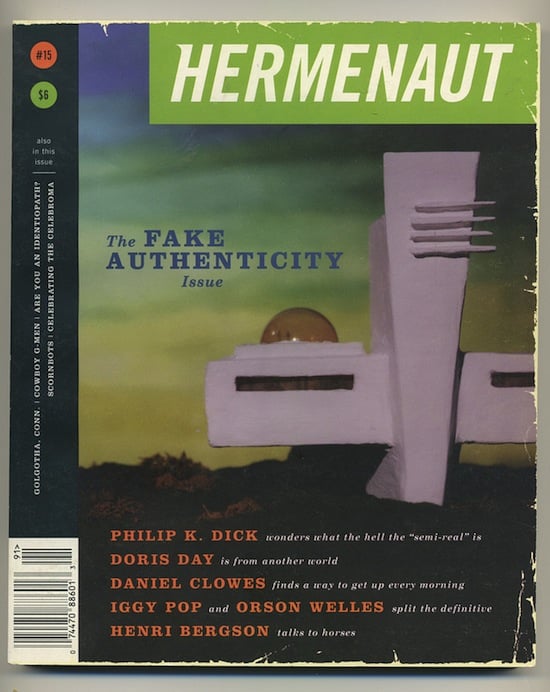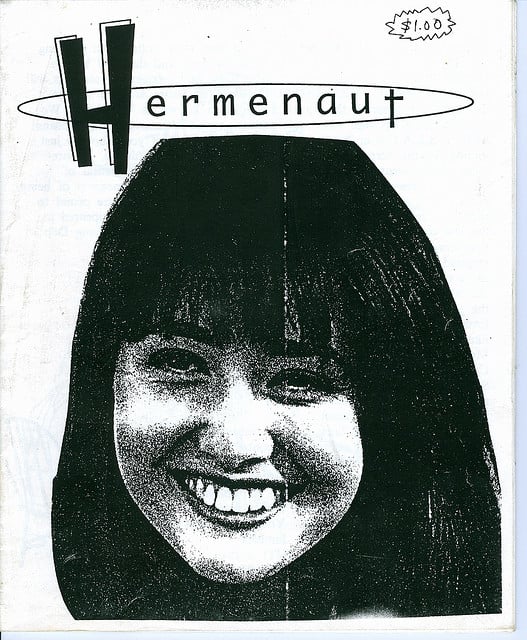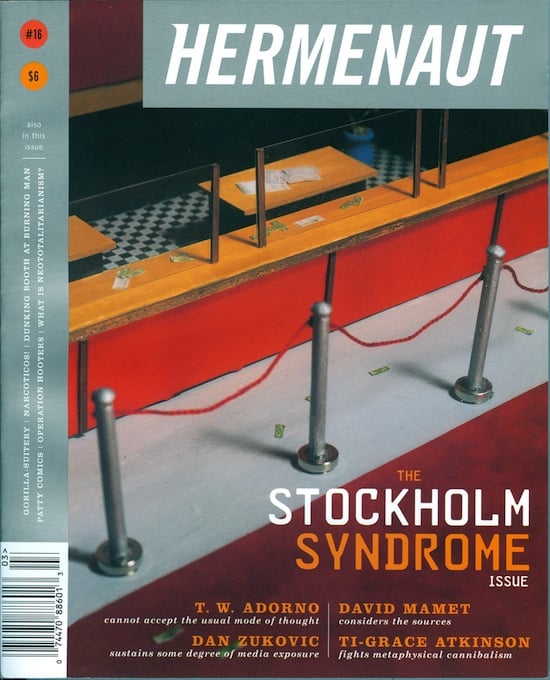SINCERITY
By:
June 2, 2021
This essay first appeared (in December 2020) in Post Road — a literary journal published by the Department of English at Boston College. Thank you, Carlo Rotella, for inviting me to participate.

I’m a writer and editor; my friend Tony Leone is a designer. Since we first met, twenty years ago now, the two of us have partnered on many projects — most recently, on the UNBORED collection of family activity books and kits. When we were introduced, I had just taken an office in the old Haffenreffer brewery complex in Boston’s Jamaica Plain neighborhood, in order to devote myself full-time to publishing a high-lowbrow zine, Hermenaut.
I’d been publishing Hermenaut irregularly for years; its look typified the purposely haphazard — let’s call it authentic — zine aesthetic of the era. Tony, whose apartment happened to be a few blocks away from my office, had been creative director of the punk fanzine Commodity. Given the alt.culture context within which we’d come of age, where anything short of the defiantly amateurish was suspect, I was amazed by the design of Commodity: expressive, emotional, yet informed by traditional design conventions regarding, for example, the art and technique of arranging type, the hierarchy of visual elements, well-implemented grids, and the effective use of white space.
Since their first appearance in the 1930s, zines have trafficked in authenticity. They were made possible by the invention of the “ditto” machine and conjured into being by science fiction fans (and later, fans of folk music, TV shows, horror movies, rock, and punk) clamoring for a platform unbeholden to the relatively strict conventions of pulp magazines. Their handmade, typo-filled, badly printed medium has always been the message: Zines privilege the autonomous over the institutional and impersonal. So, even though its feature articles may have snarkily poked fun at examples of 1990s-era authenticity-mongering, at the level of form, Hermenaut was hypocritical. I was keenly dissatisfied with this state of affairs, but until Tony came on board — bringing with him a wealth of time-tested knowledge about page layout, type treatment, and so forth — I didn’t have the slightest idea what could be done about it.

I wanted the design of my zine to evolve towards what Lionel Trilling calls sincerity — the effort to internalize and embody worthwhile, time-tested social and cultural norms and forms, rather than regarding these as being “of little account, mere fantasy, or ritual, or downright falsification,” which is to say, obstacles to one’s authentic self-expression. I wanted Hermenaut to say new things, to challenge conventions, but at the same time I longed for its layout and design to be almost old-fashioned… though not ironically retro. As a reference, I gave Tony several midcentury intellectual journals and digest-sized science-fiction pulps.
I remember vividly the moment when he unveiled his page designs for Hermenaut. It was a revelation. He established a baseline grid, standardized headline treatments, fashioned a coherent navigation system — which meant that whenever we disrupted any of these design elements, it registered as a shock. The dialectic of the institutional vs. the autonomous was now enacted visually, in our pages.
Today, Tony and I share an office. Since the late 1990s, he and I have collaborated on three UNBORED family activity books, and four family activity kits — with another kit currently in progress. (Tony has also designed identity systems for various enterprises I’ve started, and we’ve collaborated on a series of reissued science fiction novels.) For each of these endeavors, at the level of both content and form, we’ve tried to walk the same line that we did when producing Hermenaut. To quote Tony’s description of his work on the UNBORED books: “We orchestrated a balance between clean, somewhat traditional typographic principles juxtaposed against energetic, sketchy illustrations and torn-paper textured accents.” The same sort of thing applies to these projects’ content. Whether Elizabeth Foy Larsen, who is coeditor of the UNBORED books, and I are assigning UNBORED features or writing them ourselves, we strive to communicate contemporary ideas in an old-school fashion (restrained, not trying to be obnoxiously relevant), while reviving bygone kids’ projects and free-range ways of living in a way that will appeal to today’s kids and their families. It’s a tricky tightrope act.
Sincerity is a balancing act, a dialectic — and sometimes that means slipping up, failing. Authenticity means never having to say you’re sorry. I’m sorry, but that’s just not for me.

MORE FURSHLUGGINER THEORIES BY JOSH GLENN: OWL | FERB YOUR ENTHUSIASM (INTRO) | VIRUS VIGILANTE | CARBONA YOUR ENTHUSIASM (INTRO) | TAKING THE MICKEY (series) | KLAATU YOU (series intro) | We Are Iron Man! | And We Lived Beneath the Waves | Is It A Chamber Pot? | I’d Like to Force the World to Sing | The Argonaut Folly | The Perfect Flâneur | The Twentieth Day of January | The Dark Side of Scrabble | The YHWH Virus | Boston (Stalker) Rock | The Sweetest Hangover | The Vibe of Dr. Strange | CONVOY YOUR ENTHUSIASM (series intro) | Tyger! Tyger! | Star Wars Semiotics | The Original Stooge | Fake Authenticity | Camp, Kitsch & Cheese | Stallone vs. Eros | The UNCLE Hypothesis | Icon Game | Meet the Semionauts | The Abductive Method | Semionauts at Work | Origin of the Pogo | The Black Iron Prison | Blue Krishma! | Big Mal Lives! | Schmoozitsu | You Down with VCP? | Calvin Peeing Meme | Daniel Clowes: Against Groovy | The Zine Revolution (series) | Best Adventure Novels (series) | Debating in a Vacuum (notes on the Kirk-Spock-McCoy triad) | Pluperfect PDA (series) | Double Exposure (series) | Fitting Shoes (series) | Cthulhuwatch (series) | Shocking Blocking (series) | Quatschwatch (series)
